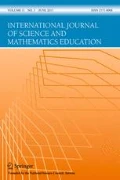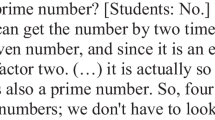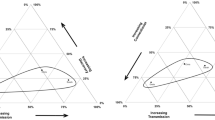ABSTRACT
This study examines the views of people involved in mathematics education regarding the commonly stated goal of using mathematics learning to develop deductive reasoning that is usable outside of mathematical contexts. The data source includes 21 individual semi-structured interviews. The findings of the study show that the interviewees ascribed different meanings to the above-stated goal. Moreover, none of them said that it is possible to develop formal logic-based reasoning useful outside of mathematics, but for different reasons. Three distinct views were identified: the intervention–argumentation view, the reservation–deductive view, and the spontaneity–systematic view. Each interviewee’s view was interrelated with the interviewee’s approach to deductive reasoning and its nature in mathematics and outside it.
Similar content being viewed by others
References
Australian Education Council (1990). A national statement on mathematics for Australian schools. Carlton, Victoria, Australia: Curriculum Corporation.
Ayalon, M. & Even, R. (2008). Deductive reasoning: In the eye of the beholder. Educational Studies in Mathematics, 69(3), 235–247.
Ball, D. L. & Bass, H. (2003). Making mathematics reasonable in school. In J. Kilpatrick, W. G. Martin, & D. Shifter (Eds.), A research companion to principles and standards for school mathematics (pp. 27–44). Reston, VA: National Council of Teachers of Mathematics.
Cheng, P. W., Holyoak, K. J., Nisbett, R. E. & Oliver, L. (1986). Pragmatic versus syntactic approach to training deductive reasoning. Cognitive Psychology, 18, 293–328.
Clements, D. H. & Battista, M. T. (1992). Geometry and spatial reasoning. In D. A. Grouws (Ed.), Handbook of research on mathematics teaching and learning (pp. 420–464). New York: Macmillan.
Cosmides, L. & Tooby, J. (1997). Evolutionary psychology: A primer. Retrieved from http://www.psych.ucsb.edu.research/cep/primer.html.
Davis, P. J. & Hersh, R. (1981). The mathematical experience. Boston: Birkhäuser.
Durand-Guerrier, V. (2003). Which notion of implication is the right one? From logical consideration to didactic perspective. Educational Studies in Mathematics, 53, 5–34.
Durand-Guerrier, V. (2008). Truth versus validity in mathematical proof. ZDM Mathematics Education, 40, 373–384.
Duval, R. (2002). Proof understanding in mathematics. Proceedings of 2002 international conference on mathematics: Understanding proving and proving to understand (pp. 23–44). National Taiwan Normal University. Retrieved from http://www.math.ntnu.edu.tw/~cyc/_private/mathedu/me1/me1_2002_1/duval.doc.
Eves, H. (1972). A survey of geometry. Boston: Allyn and Bacon.
Fawcett, H. P. (1938). The nature of proof. The 13th yearbook of the National Council of Teachers of Mathematics. New York: Teachers College.
Fey, J. T. (1991). Geometry: Educational programs. In A. Lewy (Ed.), The international encyclopaedia of curriculum. Oxford, UK: Pergamon.
Garofalo, J. & Mtetwa, K. D. (1990). Implementing the standards: Mathematics as reasoning. Arithmetic Teacher, 37(5), 16–18.
González, G. & Herbst, P. (2006). Competing arguments for the geometry course: Why were American high school students supposed to study geometry in the 20th century? International Journal for the History of Mathematics Education, 1(1), 7–33.
Hanna, G. (1990). Some pedagogical aspects of proof. Interchange, 21(1), 6–13.
Hanna, G. & Jahnke, H. N. (1996). Proof and proving. In A. J. Bishop, K. Clements, C. Keitel, J. Kilpatrick & C. Laborde (Eds.), International handbook of mathematics education (pp. 877–908). Dordrecht, The Netherlands: Kluwer Academic.
Herbst, P. (2002a). Establishing a custom of proving in American school geometry: Evolution of the two-column proof in the early 20th century. Educational Studies in Mathematics, 49, 283–312.
Herbst, P. (2002b). Engaging students in proving: A double bind on the teacher. Journal for Research in Mathematics Education, 33(3), 176–203.
Herbst, P., Chen, C., Weiss, M., González, G., Nachlieli, T., Hamlin, M. et al. (2009). “Doing proofs” in geometry classrooms. In D. A. Stylianou, M. L. Blanton & E. J. Knuth (Eds.), Teaching and learning proof across the grades. New York: Routledge.
Inhelder, B. & Piaget, J. (1958). The growth of logical thinking from childhood to adolescence. New York: Basic Books.
Jahnke, H. N. (2008). Theorems that admit exceptions, including a remark on Toulmin. ZDM Mathematics Education, 40, 363–371.
Johnson-Laird, P. N. & Byrne, R. M. J. (1991). Deduction. Hillsdale, NJ: Erlbaum.
Krummheuer, G. (1995). The ethnography of argumentation. In P. Cobb & H. Bauersfeld (Eds.), The emergence of mathematical meaning: Interaction in classroom cultures (pp. 229–269). Hillsdale, NJ: Erlbaum.
Lehman, D. R. & Nisbett, R. E. (1990). A longitudinal study of the effects of undergraduate training on reasoning. Developmental Psychology, 26, 952–969.
Leron, U. (2003). Origins of mathematical thinking: A synthesis. Retrieved from http://www.dm.unipi.it/~didattica/CERME3/WG1/TG1-list.html.
Leron, U. (2004). Mathematical thinking and human nature: Consonance and conflict. Retrieved from http://edu.technion.ac.il/Faculty/uril/Papers/Leron_ESM_%20Human_Nature.pdf.
Luria, A. R. (1976). Cognitive development: Its cultural and social foundations. Cambridge, MA: Harvard University Press.
Mariotti, M. A. (2006). Proof and proving in mathematics education. In A. Gutierrez & P. Boero (Eds.), Handbook of research on the psychology of mathematics education (pp. 173–203). Rotterdam, UK: Sense.
Ministry of Education (1990). The mathematics curriculum in grades 7–9. Jerusalem, Israel: Author.
Morris, A. K. & Sloutsky, V. M. (1998). Understanding of logical necessity: Developmental antecedent and cognitive consequences. Child Development, 69, 721–741.
National Council of Teachers of Mathematics (2000). Principles and standards for school mathematics. Reston, VA: Author.
New Zealand Curriculum Framework (1991). Retrieved from http://www.tki.org.nz/r/maths/curriculum/statement/p8_e.php.
Nisbett, R. E., Fong, G. T., Lehman, D. R. & Cheng, P. W. (1987). Teaching reasoning. Science, 238, 625–631.
Perelman, C. & Olbrechts-Tyteca, L. (1969). The new rhetoric: A treatise on argumentation. Notre Dame, IN: University of Notre Dame Press.
Polya, G. (1954). Induction and analogy in mathematics. Princeton, NJ: Princeton University Press.
Qualifications and Curriculum Authority (2006). National curriculum online. Retrieved from http://www.qca.org.uk.
Strauss, A. (1987). Qualitative analysis for social scientists. Cambridge, UK: Cambridge University Press.
Strauss, A. & Corbin, J. (1990). Basics of qualitative research: Grounded theory procedures and techniques. Thousand Oaks, CA: Sage.
Stylianides, G. J. & Stylianides, A. J. (2008). Proof in mathematics: Insights from psychological research into students’ ability for deductive reasoning. Mathematical Thinking and Learning, 10, 103–133.
Toulmin, S. E. (1969). The uses of arguments. Cambridge, UK: Cambridge University Press.
Voss, J. F. & Van Dyke, J. A. (2001). Argumentation in psychology: Background comments. Discourse Processes, 32, 89–111.
Vygotsky, L. S. (1962). Thought and language. Cambridge, MA: MIT Press.
Wu, H. (1996). The role of Euclidean geometry in high school. Journal of Mathematical Behavior, 15, 221–237.
Author information
Authors and Affiliations
Corresponding author
Rights and permissions
About this article
Cite this article
Ayalon, M., Even, R. MATHEMATICS EDUCATORS’ VIEWS ON THE ROLE OF MATHEMATICS LEARNING IN DEVELOPING DEDUCTIVE REASONING. Int J of Sci and Math Educ 8, 1131–1154 (2010). https://doi.org/10.1007/s10763-010-9238-z
Received:
Accepted:
Published:
Issue Date:
DOI: https://doi.org/10.1007/s10763-010-9238-z




